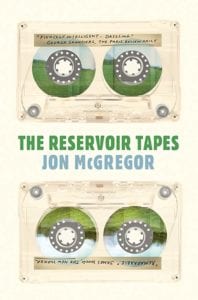
Tell us a little about The Reservoir Tapes and how it relates to your previous book, Reservoir 13.
JM:I have no shame in calling The Reservoir Tapes a ‘prequel’ to Reservoir 13. Portmanteau words are the best words. These stories all take place in the days and months leading up to the event with which Reservoir 13 opens, and are clouded by a kind of pre-emptive awareness of that event: the disappearance of a 13 year old girl from a small village in the heart of England. I wrote these stories immediately after writing the novel, when I was still immersed in that landscape and that community, and when I still had lots of unanswered questions about these people’s lives. The stories fill in some of the gaps left by Reservoir 13, I think, but they also raise new questions, and complicate the storyline. There are also more jokes.
Tell us something more, without spoilers, something that readers won’t get from reading the synopsis.
JM:You probably shouldn’t trust a man who can’t tell the difference between a llama and an alpaca.
Do readers, or should they, first read Reservoir 13 or can they read this as a standalone piece?
JM:The stories in the Reservoir Tapes were originally broadcast on BBC Radio 4, and since the audience there is around 2 million I have to assume that a few of those had not in fact already read Reservoir 13. They were definitely conceived to stand alone, and I’ve really enjoyed talking to readers who have only read the Tapes, or who have come to the Tapes after Reservoir 13, or who have read Reservoir 13 afterwards…
The Reservoir Tapes is told from 15 different perspectives, correct? Tell us a little about the process of basically retelling the book from different perspectives.
JM:Yes. In contrast to the novel, which skips between characters and settings like a stone across the surface of the water, each of these stories stays focused on a single character and gets under the skin of their perspective. There are numerous interconnections and overlaps between the stories, but each character has their own experience and I relished the opportunity to spend time dwelling on those experiences. After spending seven years working on the novel I knew most of these characters well, and so the process was simply one of developing ways of allowing the reader into that knowledge – finding the tone of voice, the quality of attention, the pace with which each character would understand the world around them.
What was your favorite character’s story to write and why?
JM:You can’t make me pick a favorite! Although I will concede that once I’d come up with the line, “It wasn’t even a llama, for starters,” Martin’s story was a real pleasure to write; it was a combination of silly and threatening that I really took to. And I have a real fondness for Donna, whose story here is almost entirely about other people doing things she has no influence over.
What was your biggest challenge writing this book?
JM:Making this book work independently of Reservoir 13, while also being intimately bound up with it; and making each story work individually (because the BBC Radio listeners might only ever hear one of them) while still making the collection work as a cohesive whole. That’s kind of two challenges, but they relate: there was a lot of thinking about the different experiences different readers might have.
Tell us a little bit about yourself, outside of being a writer.
JM:I like riding bikes. I like watching football (aka soccer) – my team, Norwich City, have just had the greatest season ever, playing intelligent and cultured football with a team of youth players and German imports – and I like dancing. There are children in my life and they are great. I think about the climate emergency a lot, and swing wildly between hope (we know how to meet the challenge, and doing so will by pleasant coincidence create a much better world to live in) and abject terror (nobody actually wants to do what is required, and it’s so close to being too late). I’d like writers to do more in terms of articulating the challenge, and the hope; and I’d like the publishing industry to play their part.
What do you have in the works next?
JM:I am working on another novel. I can’t really tell you anything about it except that it’s set in Antarctica, it’s a novel about aphasia, and I keep getting distracted by thinking about the climate emergency.
